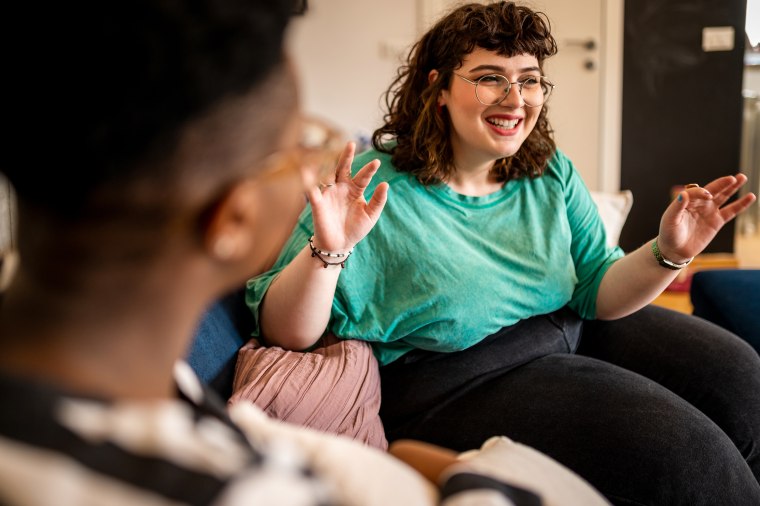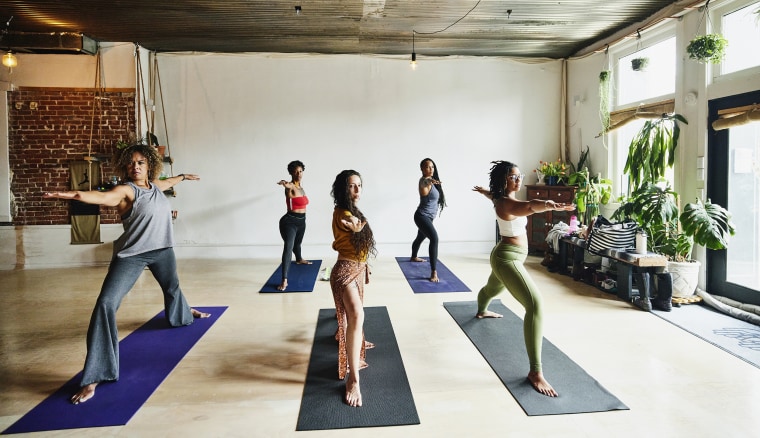Friendship is one of life’s most beautiful things — and it’s seemingly everywhere. Countless books, movies and TV shows revolve around friendship. We even use “friend” as a verb in modern-day speech, referring to the act of adding someone on social media. And yet, not much attention is given to one cold, hard fact of adulthood: It's not easy making new friends.
Solara Calderon, Ph.D., a clinical psychologist based in Encinitas, CA, sees many clients let their anxiety get in the way of forging new relationships. “People often have worried thoughts such as, ‘they probably aren’t going to like me’ or ‘what if I say something stupid?’” she says. “Rather than believe these self-critical thoughts, notice them and give yourself some kindness.”
Experts also recommend channeling the accepting spirit of our childhood selves when trying to make new, platonic connections as an adult. “One reason why children have an easy time making friends is because they’re open and curious about others — they’re not worried about being hurt or rejected,” says Angela Amias, LCSW, a psychotherapist based in Cheyenne, WY. “As adults, we tend to be more risk-averse.” The real key to making friends as an adult, she says, is to remember how to be authentic, like kids are, and connect with others from a genuine place.
That said, when you do feel a spark with someone, it can still be tricky to go from friendly-hellos to ride-or-die status. That’s where Calderon, Amias and other mental health professionals are here to help. Ahead, read their tried-and-true advice on how to make new friends as an adult — plus common faux pas to avoid.
Why it’s hard to make new friends in adulthood
First, it’s worth going deeper on the reasons it can be harder to make friends as an adult. For starters, we tend not to be surrounded by as many people, especially new people, as we age. “When we’re younger, we have new classmates, and in college, especially in dorms, we’re constantly around new people. We also have more energy to go out more and meet people,” says Avigail Lev, Psy.D., director of the Bay Area CBT Center. As adults, however, we can hold the same job or live in the same spot for years or decades, so we’re not meeting as many new people, and it’s more difficult to socialize before or after work, especially if you’re married or have children, says Lev.
As we touched on above, our fear of being rejected can also hold us back from pursuing meaningful relationships. “Adults have also had more experiences of betrayal and hurt in relationships, so they are more trepidatious when meeting new people,” says Lev, adding that adults are pickier about the people they let in to their lives, whereas when we’re younger, we’re more open. As Calderon reminds us, not everyone is going to like you either, and that’s OK. “Keep trying until you find even just one person who really gets you,” she says. “It’s worth it.”

How to make new friends as an adult
As you might imagine, there are several ways to strike up a new friendship. Amias encourages people to initiate three invitations with a potential new friend — maybe it’s lunch first, coffee second and a yoga class or a walk third. (You can also browse this list of 30 activities to do with friends.) If the other person says no to all of this and doesn’t follow up with any alternative suggestions, then it’s safe to assume that friendship isn’t in the cards, she says. It may feel scary, but you have no way of knowing if a friendship will forge or fizzle unless you try. “When both people are hesitant to put themselves out there, it leads to a mutual assumption that the other isn’t interested in friendship and missed connections,” says Amias. So, here’s how to initiate social invitations confidently:
1. Meet people in your neighborhood.
We’ll start close to home. “For most adults, proximity is key,” says Calderon. “It’s simply less likely that you will get together with friends who live in another town with rush hour traffic.” Instead, think creatively about how to meet people who live close by. Based on the way Calderon met one of her closest friends as an adult, she suggests joining your local “Buy Nothing” group on Facebook, as these will all be people who live right next door. “See a neighbor posting in search of a sourdough starter? Maybe you love baking bread and have some to share. Take a risk and strike up a conversation with them — before you know it, maybe you’ll invite them over to bake a loaf together,” she says.
Similarly, Lev notes that you can join local meet-up groups or attend nearby Facebook events. Even better, start your own event or meet-up group for a hobby you enjoy, such as a book or jogging club. “Doing things you enjoy can help you meet other people who enjoy similar things,” says Lev.
2. Sign up for something new.
Even in your home turf, there are plenty of opportunities to push yourself outside your comfort zone and try something you’ve never done before. Amy Morin, LCSW, a psychotherapist based in Marathon, FL, and the author of 13 Things Mentally Strong People Don’t Do, suggests going deep sea fishing, taking golf lessons, or trying a yoga class. Whatever you choose, “be up front about the fact that it’s your first time or you don’t know what you’re doing,” says Morin. “It’s almost guaranteed that people will gravitate toward you to help; it’s an easy way to start a conversation.”
3. Try friendship apps.
Apps for romantic relationships are omnipresent, inspiring a burgeoning market for online friendship connectors — especially for women. Take Bumble BFF, which launched in 2016 and has grown in popularity since. “People are making a lot of new friends on it,” says Lev.
For those 60+, Nonprofit 92Y’s Himan Brown Program offers connection-heavy online programming including trivia groups, social worker-led discussions and fitness classes for $75. And for adults 55+, the online platform Hank promises to expand your social circle with people in your area, with seven out of 10 members reporting feeling significantly less lonely after becoming a member.
If you’re a woman navigating fertility, pregnancy or menopause, there’s the Peanut app. “I have a lot of clients who are new moms, and the Peanut app is a lifesaver in connecting them to other new moms who live nearby,” says Calderon. “Nothing is better than meeting up for a walk to confide in each other about the ups and downs of early parenthood.”
4. Make pals through volunteer work.
“There’s truth to the theory that the best way to make good friends is to spend time volunteering for organizations that matter to you,” says Amias. “You’ll meet other people who share your values and a desire to engage with the outer world.” She adds that extending the friendship outside of volunteer hours can be as easy as asking, “What sorts of things do you do when you’re not here?”
You can also share your plans for future volunteer days. “If you’re doing a walk for charity or you’re volunteering at an event, you can turn acquaintances into friends by asking them to join you,” suggests Morin.
5. Embark on a far-flung retreat.
Making friends sometimes means exploring different terrain. “As adults, we tend to get stuck in routines,” says Amias. “The reason why people who share an unusual experience together, like living in a foreign country or long-distance hiking, make such deep connections is because they are out of their familiar contexts and end up bonding over the experience.”
A far-flung getaway might be just the ticket to creating your own unusual experiences. “Whether it’s meditating in India or yoga in Hawaii, a retreat is a great way to bond,” says Morin, adding that you can find ones with people who are traveling solo and still want to be around others. There are also summer camps for adults, she adds. Once you’re there, sign up for activities, whether zip-lining or a cooking class. “When you’re doing something fun, you’ll feel excited about the people around you and bond,” says Morin.
6. Once you’re socializing, be open with people.
Maybe you’ve set up the coffee date or drinks. Or, “perhaps you already have lots of acquaintances but fewer deeper, more meaningful friendships,” says Calderon. Is there someone you already know but would like to know better? A coworker, perhaps, or someone you casually chat with before and after your spin class? Set up a hangout with them and “share something more personal than you otherwise might,” she says. For instance, are you finding work-life balance particularly hard right now or have your relationships with your parents been changing as they age? “Being emotionally vulnerable helps us form more genuine connections,” says Calderon. Morin recommends Club Getaway (which offers weekend-only camp adventures); Camp No Counselors for pool parties, lip sync battles and games aplenty (“some people bring a friend or go with a group but many individuals go on their own”), and Endless Summer Surf Camp for newbies and experienced surfers alike (which offers overnight options, but the day-only packages “can be a good option for people who want a little time to themselves in the evenings”).

3 things to avoid when making new friends
1. Putting too much pressure on yourself.
Amias emphasizes that one of the best ways to make friends is to stop pressuring yourself to make friends. Beating yourself up will only make you feel more discouraged and less likely to put yourself out there and meet people. “Instead, focus on finding activities that you truly enjoy. This might be painting, or browsing bookstores or stargazing,” Amias says. “Pursuing true passions that are important to your identity puts you on the path to meeting others who share your values and enjoy similar interests.”
2. Not being clear about wanting to be friends.
Like any relationship, you’ve got to make your intentions clear. “When you’re in an environment where you’re meeting like-minded individuals, be expressive in your interest to be friends. We’re living in a world with a lot of ghosting and saying we’ll meet up and then not actually following through,” says Lev. “Speaking to that explicitly shows that you’re serious about showing up for this person, and also motivates them to show up as well.”
3. Coming on too strong.
Morin and Lev both report seeing clients who start out too strong when seeking new friends. In this case, Morin says people can appear needy or clingy when they are in the early stages of a friendship and it sometimes pushes the other person away. “Sometimes they disclose deeply personal things too soon, or they expect more frequent contact and the other person fears that the friendship is going to be a lot of work and they take a step back,” says Morin. In these cases, she suggests monitoring how much the other person is reciprocating. “If you’re reaching out repeatedly and the other person isn’t, it’s a sign they may not want such frequent contact,” says Morin. “Back off a little to give them some room.” Bottom line, she adds: “When other people have a chance to reciprocate, it will allow the relationship to grow naturally.”
